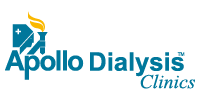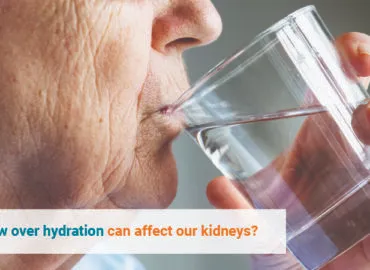How Over Hydration Can Affect Kidneys?
- It is easy to believe, more hydration is always better. Every individual is directed to drink lots of water on a daily basis. While it’s definitely a good practice, everything has two extremes. What you’re not aware of is that too much water can be harmful to your body. Tough to believe it, isn’t it?
- Water intoxication is an existing condition in spite of how ironic it may sound. It is common knowledge that drinking water is a healthy practice. Overdoing can be dangerous for your health, causing damage afflicting the routine bodily functions. This comes in as an even bigger challenge to those who are suffering from kidney disease and undergoing hemodialysis. Maintaining hydration levels in such patients is complicated, increasing risks.
Signs that you’re over hydrating your body
Overhydration among dialysis patients can cause edema where your feet, ankles and wrists swell up. Maintaining optimal blood pressure is another challenge faced by these patients in addition to shortness of breath and other heart problems. Apart from which, signs of headache, nausea, fatigue, confusion and restlessness are seen when the condition is relatively severe.
Undergoing dialysis or not, do not turn a blind eye to any such signs as overhydration. When left unattended, it can turn serious, or even lead to death in worst-case scenarios.
Result of Overhydration: Hyponatremia
Fluid overload, aka, hypervolemia, makes it difficult for the kidneys to function normally, resulting in retention of excessive water thereby diluting the blood’s salt content. Hyponatremia is the medical term used for such a condition. Patients suffering from chronic kidney disease are more prone to hyponatremia as their kidneys are already weak making it even more difficult in handling surplus liquids. During dialysis, fluid retention more than the maximum amount may lead to symptoms of heart failure risking the patient’s life.
How can Hyponatremia be treated?
Treatment varies depending on the gravity of your condition. Depending on the severity of your condition, you will be asked to follow one or all of these solutions:
- IVs: Saline solutions may be injected into your body in order to heighten the salt content in your blood.
- Medicines: Prescription of medicines to help and retain the sodium levels in your body by helping your kidneys get rid of more urine.
- Dialysis: In severe case scenarios, you may have to support your kidneys in filtering and excretion by undergoing dialysis.
The Right Water Diet:
Generally speaking, managing your liquid intake in terms of both the right amount and the right time, plays an important role in preventing hyponatremia.
Consuming 8 glasses of water per day is a generalized idea in all minds. But, the normal water intake level cannot be the same for everybody as it also depends on various factors like health conditions, size, weather and physical activities.
For a dialysis patient, liquid intake has to be given utmost priority. Here’s how overhydration can be avoided:
- Always maintain a track of your fluid intakes.
- Try rinsing your mouth with mouthwash to get rid of dryness.
- Consume water from very small cups.
- Eat frozen fruits and vegetables.
- Keep a check on salt intake.
- Modify dialysis needs according to your requirements as suggested by your doctor.
Basic Guidelines for the general public:
- Males: You should drink up to 13 glasses of fluid daily amounting to 3 liters approximately.
- Females: You are required to consume a little over 2 liters, that is about 9 glasses of fluid per day. Although, if you have a baby along the way, up your intake to 10 glasses of liquids every day, and if you are a mother who is breastfeeding, 12 glasses of fluids are advisable.
- Kids and Teenagers: The little ones have to mandatorily drink up to 8 glasses of fluid on a daily basis and also consume a lot of fresh fruits and vegetables in addition to liquids.
Additionally, it is advisable to treat related conditions like adrenal gland insufficiency which would contribute to hyponatremia. Educating oneself about the impact of diuretic medications or any new prescriptions should be given key importance.

